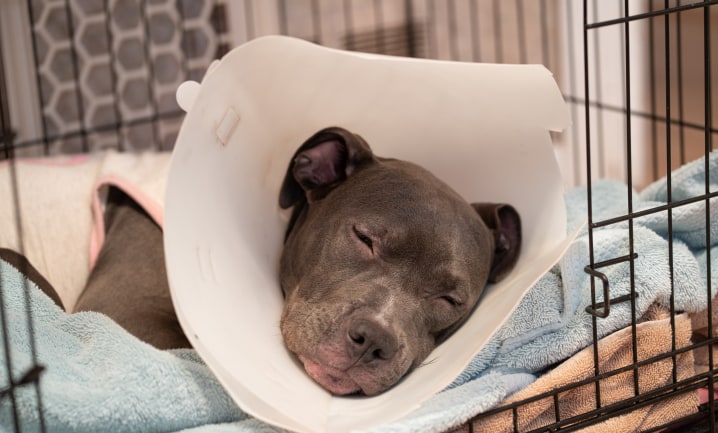Preventive Measures for Improved Health
Prevent unwanted pregnancies and reduce the risk of your pet contracting numerous diseases by having them spayed or neutered.

Spaying or neutering your pet
Shelters across the country see millions of unwanted cats and dogs come through their doors every year. Worse, many animals are euthanized.
By having your cat or dog spayed or neutered, you'll be helping to prevent unwanted pregnancies as your pet comes of age. Spaying or neutering can also reduce the risk of your pet developing serious health problems.
What is the difference between spaying and neutering?
When we spay or neuter your pet, we put them under general anesthesia and surgically sterilize them.
SPAYING (FEMALES) Spaying (also known as ovariohysterectomy) involves removing a female's reproductive organs.
NEUTERING (MALES) Neutering (also known as orchiectomy) involves removing the testicles. Considered a simpler procedure than a spay, the term 'neutering' can also refer to the desexing or 'fixing' of either gender.
Spaying & Neutering FAQs
ASK A DIFFERENT QUESTION
- At what age should I have my pet spayed?
Consult with your veterinarian to learn when you should spay or neuter your pet. Some data indicate there may be benefits to your pet's long-term health if you wait to spay or neuter your dog until after they have passed puberty.
Many vets recommend dog owners bring their puppies in to be spayed before their first heat, which can arrive as early as 5 months old. However, increasing evidence suggests that this is too early as puppies have not yet fully developed.
- What can I expect during the recovery process?
SPAYING Following a spay surgery, some clinics will want to keep your dog until the next day, while others will allow her to go home on the same day. You'll want to keep them on restricted activity for 7 to 10 days.
NEUTERING Provided no complications arise from your dog's or cat's neutering procedure, they can usually come home on the same day of the operation, on a schedule of restricted activity for a few days while their incision heals.
After both procedures, your pet may be able to come home with a protective collar to keep him or her from licking their incision.
Typically, we will book a follow-up visit to confirm your pet has healed and to take out the stitches.
- Will my pet feel anything during the procedure?
We will give your pet a dose of general anesthesia, so they will not feel any pain during the surgery.
- Will my pet gain weight after the procedure?
Your pet will not gain weight as a direct result of being spayed or neutered, but they will keep growing to reach their full adult weight following the procedure, which will include weight gain.
With a healthy diet and exercise appropriate to their breed, size, and health status, your pet can maintain a healthy weight after being spayed or neutered.
- Is this service included in your Pet Wellness Plans?
We do not include spay/neuter services in our Wellness Plans as they are one-time procedures. However, if you purchase a Wellness Plan for your pet, you will automatically receive a 10% discount on the spay/neuter surgery.
Benefits For Dogs
Spaying or neutering your dog offers 6 key benefits:
- It cuts the risk of prostate and other cancers.
- Your dog's heat cycle will be gone. Say goodbye to nervous behaviors, bleeding, and crying when they are in heat.
- It reduces issues stemming from marking and spraying.
- It stabilizes your dog's mood and makes them calmer.
- It reduces the urge to mate.
- It can curtail sexualized behaviors.
Benefits For Cats
Spaying or neutering your cat offers 6 key benefits:
- Say goodbye to naughty behaviors, including marking territory by spraying urine.
- Neutered cats are less likely to wander from home.
- Your cat may act more affectionate.
- It cuts the risk of your cat contracting certain diseases.
- It diminishes the risk of uterine infection for female cats.
- It may curtail the risk of mammary (breast) cancer in female cats.
